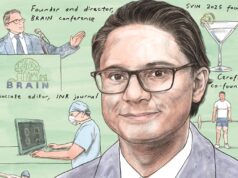
In a guest piece for NeuroNews, Blaise Baxter (San Francisco, USA) discusses empathy and compassion in the working life of a neurointerventionist, and highlights the integral importance of maintaining positive doctor-patient relationships.
The day is off to a familiar start. A code ‘Stroke’ just fired and there is an emergent large vessel occlusion (ELVO) being transferred with an estimated time of arrival (ETA) of 45 minutes. The subarachnoid haemorrhage (SAH) that finally arrived in the intensive care unit (ICU) at midnight has had an external ventricular drain (EVD) placed and needs to be squeezed in between the elective aneurysm and the dural fistula embolisation.
With the volume of work and the hectic nature of each day, it becomes easier to begin to think in terms of cases rather than the patients themselves. Additionally, the US Health Insurance Portability and Accountability Act (HIPAA) has made it easier for us to convince ourselves that we detach to protect our patient’s identity. However, if we are to be honest, there is an element of depersonalisation associated with performing high-intensity medical procedures, day in and day out. For me personally—and I am sure it is true for all operators in our field—our patients and their families are the reason we do what we do. So, if our patients are of primary importance, how do we avoid the trap of depersonalisation?
As medical professionals, we enter into a unique and privileged relationship with a patient and their family. At a showstopping moment in someone’s life, when they are experiencing a life-threatening medical crisis, we show up, and a rapid and deep bonding process begins. Within minutes, family members must make critical life and death decisions regarding a loved one—based on the information we give them. They must quickly decide to put their complete trust in a stranger who has outlined a plan that, for most, is completely foreign. Regardless of where this journey leads, the intimate doctor-patient/family relationship has begun.
To develop this relationship in a healthy manner, we must purposefully think about our human kindness and interpersonal skills during these typically brief encounters. It can be easy to give in to the time pressures we feel, but being hurried often leaves a family feeling like they were shortchanged in terms of a clear and understandable explanation. More importantly, being in a rush often leaves an impression that they are not dealing with someone who truly cares.
“There is a delicate balance between becoming over attached or over familiar, and remaining professional but not uncaring.”
Honing great communication and interpersonal skills is something that is overlooked all too often in the medical school course curriculum. Empathy, compassion, kindness, patience and being a great listener are all essential skills to cultivate the doctor-patient relationship. We frequently have to build on the limited training we receive in these skillsets by observing others as they interact with patients and their families.
Neurovascular procedures are high stakes and not without risk. These inherent challenges can also factor in to depersonalising the procedural work we perform. We are forced to develop our own coping mechanisms to deal with the inevitable losses that occur when dealing with such devastating disease states. There is a delicate balance between becoming over attached or over familiar, and remaining professional but not uncaring. Regardless of the difficulty, we must strive to find that balance so that we can more effectively treat our patients and support their families.
To ‘re-personalise’ the relationships we have with patients and families, the Society of NeuroInterventional Surgery (SNIS) introduced the Amy Walters Patient Lectureship award in 2019. This award is given annually at the SNIS meeting to highlight a patient and their family’s journey after suffering a neurovascular crisis. The namesake for the award, Amy Walters, is a dear friend and colleague in the neurovascular community who suffered a major stroke while attending the SNIS annual meeting in 2017. Amy, working with Adam Arthur and Marie Williams, created the award to focus on the journey our patients and their families embark upon on their road to recovery.
Readjusting our perspective by concentrating on patients and families is just one way that we can ensure that our goal remains to serve and walk with those individuals who cross our paths at the most vulnerable moments of their lives.
As stated in the Hippocratic Oath: “I will remember that there is art to medicine as well as science, and that warmth, sympathy and understanding may outweigh the surgeon’s knife or the chemist’s drug.”
Blaise Baxter is an interventional neuroradiologist at Sutter Health’s California Pacific Medical Center (CPMC) Van Ness Campus in San Francisco, USA. He is also a past president of the SNIS and the current chair of the SNIS Foundation. In addition, Baxter was an associate professor and chair of radiology at the University of Tennessee College of Medicine in Chattanooga, USA for several years.










